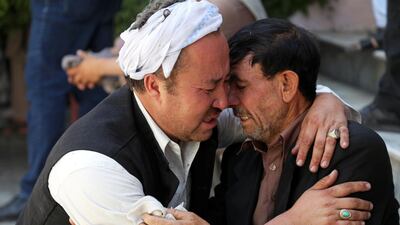On Saturday, Kabul was rocked by yet another tragedy. At what should have been a joyous occasion – a wedding with 1,200 people gathered – a suicide bomber detonated his explosives, killing 63 guests, including children.
The attack was claimed by ISIS, sparking fears the group is resurgent and exploiting vulnerabilities in other territories after being driven from Iraq and Syria. This assault is the latest in a series of attacks on civilians, primarily perpetrated by the Taliban, as well as groups such as Al Qaeda and ISIS.
July was the deadliest month in two years in Afghanistan, according to the United Nations. A recent UN report attributed 11 per cent of the 4,000 civilian casualties this year to IS Khorasan, the Afghan branch of ISIS, whose numbers are swelling with disenfranchised youth. As the Taliban’s influence wanes, fighters have defected.
The surge in violence comes a month ahead of presidential elections, just as precarious negotiations are under way for a US troop withdrawal and an end to the 18-year war in Afghanistan. Despite the US administration suggesting it was close to a peace deal with the Taliban, the group has denounced the elections as a sham and warned it would target rallies with deadly attacks. This shows the hurried move to end America’s war for what it is: an appeal to US President Donald Trump’s conservative base ahead of the 2020 presidential elections, which could prove to be at the expense of ordinary Afghans.
At the height of their rule, the Taliban governed more than 90 per cent of the country and imposed their narrow view of Islam on Afghan society. ISIS in Iraq and Syria followed a similar ideology, with oppressive restrictions, and undoubtedly its counterparts in Afghanistan would wish to do the same. The relative success of the Taliban in the country has encouraged other extremist groups to flourish. IS Khorasan has an estimated 5,000 members and is a rising security threat, as Saturday’s bomb blast shows. With the Taliban seen by some hardline elements as weak for sitting at the negotiating table with the US, some of its most uncompromising members are defecting and joining the rival group. Even if the US manages to strike an agreement with the Taliban, Afghanistan will still be vulnerable to attacks from other terrorist groups. A hasty drawdown of American troops solely motivated by US domestic policy can only allow extremism to fester. In Syria, Mr Trump announced he will start cutting back on the number of US troops after the downfall of ISIS. Since then, experts have repeatedly warned that ISIS members have been regrouping. A peace deal for Afghanistan must include a long-term strategy to protect it from the forces of evil that would wish to prevail, and better opportunities for its people to prevent a poisonous ideology from taking hold. It is the people of Afghanistan, not the interests of the US or the Taliban, that should be at the heart of plans for its future.

